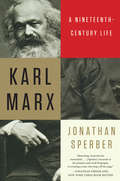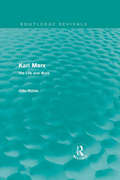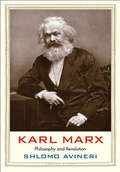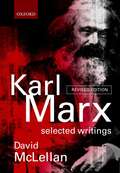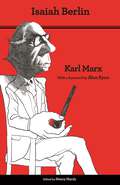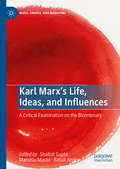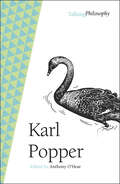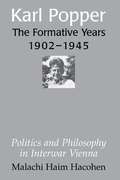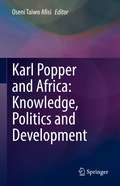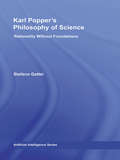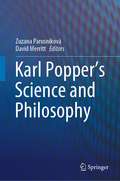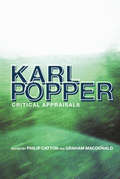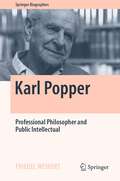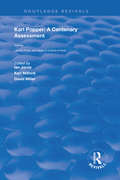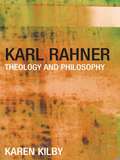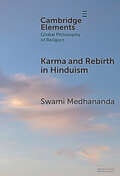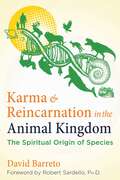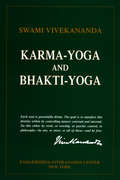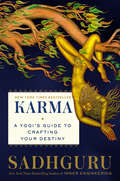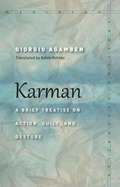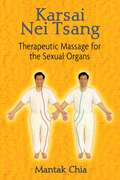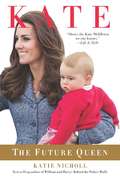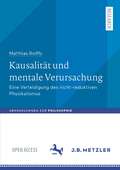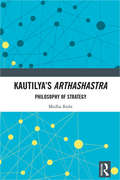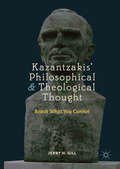- Table View
- List View
Karl Marx: A Nineteenth-century Life
by Jonathan Sperber"Absorbing, meticulously researched. . . . [Sperber] succeeds in the primary task of all biography, re-creating a man who leaps off the page." --Jonathan Freedland, New York Times Book Review In this magisterial biography of Karl Marx, "likely to be definitive for many years to come" (John Gray, New York Review of Books), historian Jonathan Sperber creates a meticulously researched and multilayered portrait of both the man and the revolutionary times in which he lived. Based on unprecedented access to the recently opened archives of Marx's and Engels's complete writings, Karl Marx: A Nineteenth-Century Life provides a historical context for the personal story of one of the most influential and controversial political philosophers in Western history. By removing Marx from the ideological conflicts of the twentieth century that colored his legacy and placing him within "the society and intellectual currents of the nineteenth century" (Ian Kershaw), Sperber is able to present a full portrait of Marx as neither a soothsaying prophet of the modern world nor the author of its darkest atrocities. This major biography fundamentally reshapes our understanding of a towering historical figure.
Karl Marx: His Life and Work (Routledge Revivals)
by Otto RühleFirst published in English in 1929, this is a reissue of Otto Rühle's comprehensive biography of Karl Marx. Written by a leading Marxist and key figure within the German Labour movement, this is an exceptionally detailed and well-researched study which sets Marx's life and work firmly within its social and historical context before examining in depth the major events of his life and the writings for which he has become such an influential figure in modern political philosophy. The final chapter offers an appraisal of both the man and his work, as Rühle summarises why he believes Marx was a genius.
Karl Marx: Philosophy and Revolution (Jewish Lives)
by Shlomo AvineriThis new exploration of Marx as a Jewish thinker presents “a perceptive and fair-minded corrective to superficial treatments” of his life and work (Jonathan Rose, Wall Street Journal).A philosopher, historian, sociologist, economist, current affairs journalist, and editor, Karl Marx was one of the most influential and revolutionary thinkers of modern history. But he is rarely thought of as a Jewish thinker, and his Jewish background is either overlooked or misrepresented. Here, distinguished scholar Shlomo Avineri argues that Marx’s Jewish origins made a significant impression on his work. Marx was born in Trier, then part of Prussia, and his family had enjoyed full emancipation under earlier French control of the area. But then its annexation to Prussia deprived the Jewish population of its equal rights. These developments led to the reluctant conversion of Marx’s father, and similar tribulations radicalized many other Jewish intellectuals of that time.Avineri puts Marx’s Jewish background in its proper and balanced perspective, and traces Marx’s intellectual development in light of the historical, intellectual, and political contexts in which he lived.
Karl Marx: Selected Writings
by Karl Marx David McLellanThis second edition of McLellan's comprehensive selection of Marx's writings includes carefully selected extracts from the whole range of Marx's political, philosophical, and economic thought. Each section of the book deals with a different period of Marx's life, allowing readers to trace the development of his thought from his early years as a student and political journalist in Germany up through the final letters he wrote in the early 1880s. A fully updated editorial introduction and bibliography has been included for each extract in this new edition.
Karl Marx: Thoroughly Revised Fifth Edition
by Isaiah BerlinIsaiah Berlin's intellectual biography of Karl Marx has long been recognized as one of the best concise accounts of the life and thought of the man who had, in Berlin's words, a more "direct, deliberate, and powerful" influence on mankind than any other nineteenth-century thinker. A brilliantly lucid work of synthesis and exposition, the book introduces Marx's ideas and sets them in their context, explains why they were revolutionary in political and intellectual terms, and paints a memorable portrait of Marx's dramatic life and outsized personality. Berlin takes readers through Marx's years of adolescent rebellion and post-university communist agitation, the personal high point of the 1848 revolutions, and his later years of exile, political frustration, and intellectual effort. Critical yet sympathetic, Berlin's account illuminates a life without reproducing a legend. New features of this thoroughly revised edition include references for Berlin's quotations and allusions, Terrell Carver's assessment of the distinctiveness of Berlin's book, and a revised guide to further reading.
Karl Marx’s Life, Ideas, and Influences: A Critical Examination on the Bicentenary (Marx, Engels, and Marxisms)
by Marcello Musto Shaibal Gupta Babak AminiSince the latest crisis of capitalism broke out in 2008, Marx has been back in fashion, and sometimes it seems that his ideas have never been as topical, or as commanding of respect and interest, as they are today. This edited collection arises from one of the largest international conferences dedicated to the bicentenary of Marx’s birth. The volume contains 16 chapters authored by globally renowned scholars and is divided into two parts: I) On the Critique of Politics; II) On the Critique of Political Economy. These contributions, from multiple academic disciplines, offer diverse perspectives on why Marx is still so relevant for our times and make this book a source of great appeal for both expert scholars of Marx as well as students and general readers who are approaching his theories for the first time.
Karl Popper (Talking Philosophy)
by Anthony O’HearSir Karl Popper was a major thinker of the twentieth century, one who – as Anthony O'Hear writes in his new Foreword – 'has had a beneficent influence on those who have come under the spell of his thought and of the inimitable prose in which he articulates it'. It is now twenty-five years since Popper died, and thus seems – after a quarter of a century – an apposite moment to revaluate his impact, significance, and influence. The several chapters in this classic volume focus on many key elements of Popper's thought and philosophy. They are by no means uncritical, but afford Popper the respect due to a philosopher who wrote always with a degree of clarity, precision, and directness rare in the academic world of his time, and – as O'Hear puts it – 'even rarer subsequently'. This important book constitutes an essential introduction to some of the most esteemed philosophical writing of our times.
Karl Popper - The Formative Years, 1902-1945 Politics and Philosophy in Interwar Vienna
by Malachi Haim HacohenThis intellectual biography recovers the legacy of Karl Popper (1902-1994), the progressive, cosmopolitan, Viennese socialist who combated fascism, revolutionized the philosophy of science, and envisioned the Open Society.
Karl Popper and Africa: Knowledge, Politics and Development
by Oseni Taiwo AfisiThis book provides a diverse contextualization of Popper’s critical rationalism concerning knowledge and his generalized attitude of criticism on appropriate social and political reforms in contemporary Africa. The book evaluates how best to address contemporary political problems, especially in politically very troubled parts of the world. To address these contemporary problems, especially as it relates to Africa, the authors found the political philosophy of Popper as suitable. The discussion of Popper’s political philosophy engages us directly with all the particularities of socio-economic and political problems within contemporary Africa. In other words, it presents the truth of the present socio-political reality in Africa where the question of what kinds of political ideas and concepts can be offered as appropriate to a political environment, which so greatly faces facets of developmental issues. Although the issues and events that informed the writings of Popper’s The Poverty of Historicism as well as The Open Society and Its Enemies, were among others, the rise of fascism and communism in Europe, the inventiveness of this work is how happily scholars in non-liberal societies, such as in Africa, can pick up Popper’s insights and usefully work with them to offer appropriate social reforms for their society. This volume is a critical juxtaposition of Popper’s ideas in a bid to make good sense of social and intellectual conditions in Africa, particularly as it relates to the scale and speed of social change that is needed in most African nations that are often ridden by corruption. The book is suitable for studies in political philosophy, economic and development studies, African Studies and Indigenous Knowledge systems.
Karl Popper's Philosophy of Science: Rationality without Foundations (Routledge Studies in the Philosophy of Science)
by Stefano GatteiThis book seeks to rectify misrepresentations of Popperian thought with a historical approach to Popper’s philosophy, an approach which applies his own mature view, that we gain knowledge through conjectures and refutations, to his own development, by portraying him in his intellectual growth as just such a series. Gattei seeks to reconstruct the logic of Popper’s development, in order to show how one problem and its tentative solution led to a new problem.
Karl Popper's Science and Philosophy
by Zuzana Parusniková David MerrittOf all philosophers of the 20th century, few built more bridges between academic disciplines than Karl Popper. He contributed to a wide variety of fields in addition to the epistemology and the theory of scientific method for which he is best known. This book illustrates and evaluates the impact, both substantive and methodological, that Popper has had in the natural and mathematical sciences. The topics selected include quantum mechanics, evolutionary biology, cosmology, mathematical logic, statistics, and cognitive science. The approach is multidisciplinary, opening a dialogue across scientific disciplines and between scientists and philosophers.
Karl Popper: Critical Appraisals
by Philip Catton Graham MacdonaldOne of the most original thinkers of the century, Karl Popper has inspired generations of philosophers, historians, and politicians. This collection of papers, specially written for this volume, offers fresh philosophical examination of key themes in Popper's philosophy, including philosophy of knowledge, science and political philosophy. Drawing from some of Popper's most important works, contributors address his solution to the problem of induction, his views on conventionalism and criticism in an open society, and his unique position in 20th century philosophy. They also examine the current relevance of Popper to understanding liberal democracy, his critique of tribalism and his relationship with analytic philosophy in general - and with Wittgenstein in particular - as well as drawing on the studies of Isaac Newton and Albert Einstein to assess Popper's conception of science.
Karl Popper: Professional Philosopher and Public Intellectual (Springer Biographies)
by Friedel WeinertKarl R. Popper is widely regarded as one of the most influential 20th century philosophers. In this new biography, Weinert provides a comprehensive and accessible account of his life and work, also addressing Popper’s role as a public intellectual. Drawing on a wide range of sources and interviews with former colleagues and collaborators, he recounts not only the wide interest from the scientific community, but also the inspiration that politicians took from Popper’s work. The book surveys the vast and varied intellectual landscape of Popper's philosophical journey during his long career: from the natural and social sciences (physics, evolution, sociology) to political philosophy and the philosophy of mind. It pays significant attention to Popper’s critical method - i.e., the notion that ideas and institutions should be exposed to rigorous tests – the approach that led him to a fervent defence of objectivity, rationality and realism, against all forms of irrationalism, as well as a passionate advocacy of freedom, social justice and liberal democracy, against all forms of authoritarianism. The book brings Popper into focus as a modern Enlightenment philosopher.
Karl Popper: Volume I: Life and Time, and Values in a World of Facts (Routledge Revivals)
by Ian JarvieOriginally published in 2006. Sir Karl Popper (1902 1994) is one of the most controversial and widely read philosophers of the 20th century. His influence has been enormous in the fields of epistemology, logic, metaphysics, methodology of science, the philosophy of physics and biology, political philosophy, and the social sciences, and his intellectual achievement has stimulated many scholars in a wide range of disciplines. These three volumes of previously unpublished essays, based on lectures given at the congress KARL POPPER 2002 held in Vienna to mark the centenary of Popper's birth, provide an up-to-date examination of many aspects of Popper's life and thought. Volume II deals especially with Popper's metaphysics and epistemology, including his proposal (critical rationalism) that it is through sharp criticism rather than through the provision of justification that our knowledge progresses. Several papers tackle the problem of the empirical basis, and offer decidedly different answers to some unresolved questions. The volume contains also a number of papers evaluating Popper's celebrated, but much contested, solution to Hume's problem of induction.
Karl Rahner: Theology and Philosophy (Spck Introductions Ser.)
by Karen KilbyKarl Rahner is one of the great theologians of the twentieth century, known for his systematic, foundationalist approach. This bold and original book explores the relationship between his theology and his philosophy, and argues for the possibility of a nonfoundationalist reading of Rahner. Karen Kilby calls into question both the admiration of Rahner's disciples for the overarching unity of his though, and the too easy dismissals of critics who object to his 'flawed philosophical staring point' or to his supposedly modern and liberal appeal to experience. Through a lucid and critical exposition of key texts including Spirit in the World and Hearer of the Word, and of themes such as the Vorgriff auf esse, the supernatural existential and the anonymous Christian, Karen Kilby reaffirms Rahner's significance for modern theology and offers a clear exposition of his thought.
Karma and Rebirth in Hinduism (Elements in Global Philosophy of Religion)
by Swami MedhanandaThis Element provides an argumentative introduction to the doctrines of karma and rebirth in Hinduism. It explains how various Hindu texts, traditions, and figures have understood the philosophical nuances of karma and rebirth. It also acquaints readers with some of the most important academic debates about these doctrines. The Element's primary argumentative aim is to defend the rationality of accepting the truth of karma and rebirth through a critical examination of an array of arguments for and against these doctrines. It concludes by highlighting the relevance of karma and rebirth to contemporary philosophical debates on a variety of issues.
Karma and Reincarnation in the Animal Kingdom: The Spiritual Origin of Species
by David BarretoInvestigates the spiritual anatomy and evolution of animals• Examines the anatomy of the spiritual bodies of animals, including their aura, etheric fields, chakras, and mental, astral, and buddhic bodies • Details how reincarnation and karma work in the animal kingdom, including how the way that animals die can have different effects on their spiritual bodies in the astral realms • Explores the spiritual, energetic, and psychic abilities of many animals and insects Where do the spirits of animals go after they die? Do animals have chakras or auras? Why were animals worshipped in ancient religions? Exploring these questions and more, David Barreto presents a deep investigation into the spiritual evolution of the animal kingdom, from ants and cockroaches to cats, dogs, owls, pigeons, dolphins, and whales. He examines the spiritual anatomy of animals, including their aura, etheric fields, chakras, and mental, astral, and buddhic bodies. Detailing how reincarnation works among various species, Barreto explores their experiences between physical lives, how they accrue karma, and how the way that animals die can have different effects on their spiritual bodies in the astral realms. Drawing on both modern physics and metaphysics, he reveals, for example, how dogs can love unconditionally because of their large electromagnetic field, which nourishes the etheric bodies of those around them, and how cats can detect subtle energy shifts and disharmonies and conduct etheric filtration while they sleep. Examining esoteric schools as well as ancient spiritual traditions around the world, the author explores how animals are viewed and worshipped in different religions and how animal adoration and animal-connected gods arose in ancient Egypt, India, and China. He looks at animal totems, animal archetypes, animals in alchemy, and the astral connections between animals and elementals. The author also examines the spiritual and energetic repercussions of meat consumption and animal sacrifice, revealing the astral and etheric components of slaughterhouses. Detailing the role of the animal kingdom in the Age of Aquarius, the author shows how, with the awakening of this new astrological era, animals will have their earthly lives elevated with lasting worth and dignity, equal to the love and respect they have been transmitting for millennia.
Karma-Yoga and Bhakti-Yoga
by Swami Vivekananda Swami NikhilanandaKARMA-YOGA AND BHAKTI-YOGA describes the method of reaching perfection through daily work and of sublimating human affection into divine love.
Karma: A Yogi's Guide to Crafting Your Destiny
by Sadhguru&“Full of valuable insights to guide you.&”—WILL SMITH &“Thoughtful and life-affirming . . . a must-read.&”—TONY ROBBINS &“This book will put you back in charge of your own life.&”—TOM BRADY A new perspective on the overused and misunderstood concept of &“karma&” that offers the key to happiness and enlightenment, from the New York Times bestselling author and world-renowned spiritual master Sadhguru.What is karma? Most people understand karma as a balance sheet of good and bad deeds, virtues and sins. The mechanism that decrees that we cannot evade the consequences of our own actions. In reality, karma has nothing to do with reward and punishment. Karma simply means action: your action, your responsibility. It isn&’t some external system of crime and punishment, but an internal cycle generated by you. Accumulation of karma is determined only by your intention and the way you respond to what is happening to you. Over time, it&’s possible to become ensnared by your own unconscious patterns of behavior.In Karma, Sadhguru seeks to put you back in the driver&’s seat, turning you from a terror-struck passenger to a confident driver navigating the course of your own destiny. By living consciously and fully inhabiting each moment, you can free yourself from the cycle. Karma is an exploration and a manual, restoring our understanding of karma to its original potential for freedom and empowerment instead of a source of entanglement. Through Sadhguru&’s teachings, you will learn how to live intelligently and joyfully in a challenging world.
Karman: A Brief Treatise on Action, Guilt, and Gesture (Meridian: Crossing Aesthetics)
by Giorgio Agamben Adam KotskoWhat does it mean to be responsible for our actions? In this brief and elegant study, Giorgio Agamben traces our most profound moral intuitions back to their roots in the sphere of law and punishment. Moral accountability, human free agency, and even the very concept of cause and effect all find their origin in the language of the trial, which Western philosophy and theology both transform into the paradigm for all of human life. In his search for a way out of this destructive paradigm, Agamben not only draws on minority opinions within the Western tradition but engages at length with Buddhist texts and concepts for the first time. In sum, Karman deepens and rearticulates some of Agamben's core insights while breaking significant new ground.
Karsai Nei Tsang: Therapeutic Massage for the Sexual Organs
by Mantak ChiaAn illustrated guide to releasing emotional and physical blockages in the pelvic area through massage • Presents step-by-step instructions for sexual organ massages for women and men • Explains techniques to release knots, unravel nerve and lymphatic tangles, dissolve toxins and sediments, and increase blood flow • Effective for impotency, frequent and difficult urination, painful menstruation, ovarian cysts, menopause symptoms, painful intercourse, and low libido as well as back pain, sciatica, and hormone imbalance Our sexual organs play a major role in our physical and emotional health. Many emotional traumas and stresses are stored in the pelvic region in the form of tension in the muscles, ligaments, and tendons and imbalances in the meridians and organs, resulting in an accumulation of toxins and energetic knots and tangles. Freeing the jing chi of the sexual organs--a powerful source of healing energy--Karsai Nei Tsang helps to resolve physical and emotional blockages in the pelvic area through massage, meridian clearing, and detoxification. Illustrating complete sexual organ massages for women and for men, this book guides you through the techniques of Karsai Nei Tsang--including necessary detox preparations and the underlying Chi Nei Tsang principles--and shows you how to release knots and tight muscles (including the hip, buttock, and thigh muscles), unravel nerve and lymphatic tangles, dissolve toxins and sediments, and increase blood flow to the pelvic area. Addressing common problems associated with our sexual organs, this practice can be used to treat impotency, frequent and difficult urination, painful menstruation, ovarian cysts, menopause symptoms, painful intercourse, and low libido. It is also effective in alleviating back pain and sciatica, improving the body’s alignment, strengthening the pelvic floor, balancing the hormones, and increasing general vitality.
Kate: The Future Queen
by Katie NichollKatie Nicholl, bestselling author and royal correspondent for The Mail on Sunday, gives an inside look into the life of the future Queen of England, Kate Middleton. Since becoming Duchess Catherine of Cambridge in 2011, Middleton has captivated royals fans around the world and now, Nicholl delivers the story of her early life, first romances, and love with Prince William. Nicholl will reveal new details on Middleton's initiation into royal life and, of course, her first pregnancy.
Kausalität und mentale Verursachung: Eine Verteidigung des nicht-reduktiven Physikalismus (Abhandlungen zur Philosophie)
by Matthias RolffsIn diesem Open-Access-Buch wird eine Verteidigung des nicht-reduktiven Physikalismus gegen den Vorwurf des Epiphänomenalismus entwickelt. Laut dem Vorwurf des Epiphänomenalismus folgt aus dem nicht-reduktiven Physikalismus, dass es keine mentale Verursachung gibt. Die hier entwickelte Verteidigung beruht auf einer Unterscheidung zwischen zwei Begriffen der Kausalität: Kausaler Produktion und kausaler Abhängigkeit. Es wird dafür argumentiert, dass der nicht-reduktive Physikalismus zwar darauf festgelegt ist, dass es keine mentale Verursachung im Sinne von kausaler Produktion gibt. Diese Konsequenz kann jedoch akzeptiert werden. Denn aus dem nicht-reduktiven Physikalismus folgt keineswegs, dass es keine mentale Verursachung im Sinne von kausaler Abhängigkeit gibt. Durch die Beziehungen kausaler Abhängigkeit können die vermeintlichen radikalen Konsequenzen des nicht-reduktiven Physikalismus abgewendet werden.
Kautilya's Arthashastra: Philosophy of Strategy
by Medha BishtThis book examines in detail the strategic relevance of the Arthashastra. Attributed to the fourth century B.C., this classical treatise on state and statecraft rests at the intersection of political theory and international relations. Adopting a hermeneutic approach, the book discusses certain homologies related to concepts such as power, order, and morality. Underlining the conceptual value of the Arthashastra and classical texts such as Hitopdesha and Pancatantra, this volume highlights the non-western perspectives related to diplomacy and statecraft. It shows how a comparative analysis of these texts reveals a continuity rather than a change in the styles, tactics, and political strategies. The book also showcases the value these ancient texts can bring to the study of contemporary international relations and political theory. This volume will be of interest to students, scholars and teachers of political studies, Indian political thought, and philosophy, South Asian studies, political theory and international relations.
Kazantzakis’ Philosophical and Theological Thought: Reach What You Cannot
by Jerry H. GillThis book explores the philosophical and theological thought of Nikos Kazantzakis. Kazantzakis is a well-known and highly influential Greek writer, having authored such works as Zorba the Greek and The Last Temptation of Christ, among many others. This volume focuses on the over-arching themes of Kazantzakis’ work, namely the importance of the natural world, the nature of humanity, and the nature of God, by means of an analysis of his major novels and other writings. Along the way attention is given to the views of the important scholars who have interacted with Kazantzakis’s works, including Peter Bien, Darren Middleton, and Daniel Dombrowski.
